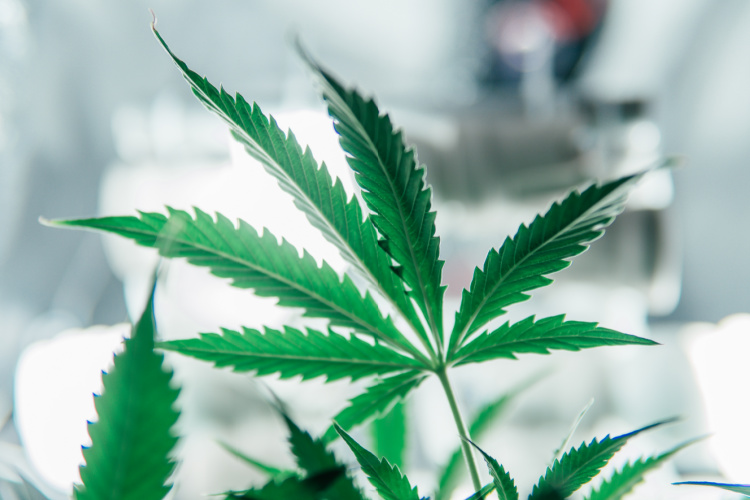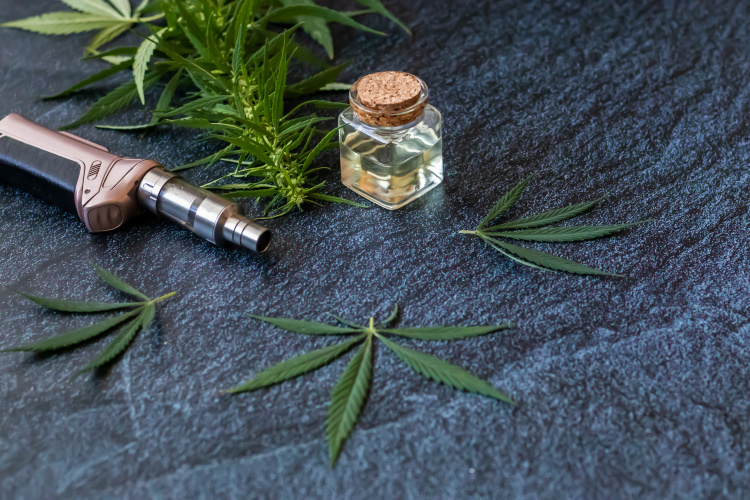If you’ve spent any time with cannabis, you’ve probably heard of THC: The cannabinoid—or “major active ingredient”—responsible for the cannabis plant’s distinctive euphoric “high,” among many other effects. But THC is only one component in the plant’s fascinating and complex ecosystem. There are dozens of different cannabinoids, including a superficially similar one known as THCA.

What’s the difference between THC vs THCA? While they’re closely related—you can think of THCA as the “mother compound” of THC—they couldn’t be more different in terms of how they affect our bodies and our minds.
If you’re interested in getting the most benefit from cannabis, today’s post should give you plenty of food for thought. We’ll break down the question of what is THCA vs THC, what are some potential THC and THCA benefits, and other considerations. By the time we’re done, you should be an expert in this lesser-known but medically impactful cannabinoid!
An Introduction to Cannabinoids
Let’s start at the beginning: What are cannabinoids? They’re a family of some 150 natural compounds that occur in the cannabis plant. They interface with our bodies through a network called the Endocannabinoid System (ECS).
And while the ECS was only identified in the past several decades, it’s believed to be one of our body’s most important regulatory networks. If you’re curious about this crucial bodily system, you can learn more about the ECS at this introductory article.
You’ve probably noticed the similarity between the words “cannabinoid” and “endocannabinoid.” That’s no accident, and it’s in large part what makes the cannabinoids such powerful medicine. In a very real sense, they’re “speaking the same language” as this vital regulatory network, and it goes a long way towards explaining why cannabinoids have the potential to exert such impactful medical effects.
Before we dive into the differences between THC vs THCA, let’s formally introduce you to THC. The single most important constituent of cannabis, THC accounts for anywhere from 2% to over 25% of cannabis flower by weight, depending upon the strain and its specific THC levels.
As we mentioned earlier, THC is the cannabinoid that imparts the cannabis plant’s distinctive euphoria, but it does a lot more than merely get us high. THC exhibits a powerful pain-fighting effect, in part by imparting natural anti-inflammatory properties at the site of an injury. And even that characteristic euphoria helps modulate our experience of pain, both in the brain and the spinal cord.
There’s much more to the story, of course. If you’d like to learn more about THC and its potential impacts, start here. Right now, it’s time to introduce THC’s “mother compound,” the cannabinoid known as THCA.
THC vs THCA: What’s the Difference?
THCA is the chemical precursor of THC present in cannabis plants, but very few consumers know much about it.
Why? For one thing, THCA isn’t psychoactive until it’s converted to THC in the process known as decarboxylation. That’s one reason you can eat all the fresh cannabis flower you want, but it won’t get you high until the THCA has been decarboxylated into THC.
Decarboxylation—the natural chemical breakdown of THCA caused by light or heat—converts THCA to THC. That’s why you can find THCA-rich products such as the cannabis concentrate labeled “diamonds” and they’ll still deliver a powerful punch once they’re smoked or vaped, and that THCA is converted to THC.
Potential Benefits of the “Mother Compound” THCA
While most people consume and are familiar with the effects of decarboxylated THCA (aka THC), that’s not to say that THCA doesn’t exert therapeutic effects on its own. As research suggests, this crucial compound imparts all sorts of effects on our bodies, ranging from fighting inflammation, treating nausea, protecting us from neurodegenerative diseases like Alzheimer’s, and even helping us fight obesity.
That’s a lot to chew on, we know. Let’s break it down piece by piece.
- Anti-Inflammatory: In 2011, a study published in the Biological and Pharmaceutical Bulletin found that THCA had a role to play in fighting inflammation. As we pointed out earlier, this places it firmly in the ballpark of other cannabinoids such as THC and CBD, which evidence shows may indirectly (and potentially directly) reduce inflammation.
- Antiemetic: A recent study published in Psychopharmacology found that THCA was even more effective than a comparable THC dosage in reducing nausea and vomiting in rodent models. That’s welcome news for those undergoing cancer treatments such as chemotherapy, the side effects of which are notoriously challenging.
- Neuroprotector: Several studies suggest that THCA can help protect us against neurodegenerative diseases such as Alzheimer’s, for which there is currently no cure. One study published in 2017 found that THCA was more powerful than THC in this effort, while another report found that THCA helps protect certain brain cells from neurodegenerative diseases.
- Metabolic Effects: And finally, a report in Biochemical Pharmacology noted that THCA appeared to reduce obesity and some of its comorbid conditions, such as diabetes and fatty liver disease.
If you’re looking to tailor your cannabis intake towards specific outcomes—for instance, the potential neuroprotective effects outlined above—you may want to seek out products with especially high THCA percentages, then choose methods of administration (such as tinctures or other ingestibles) that don’t require vaporization or combustion to deliver their beneficial effects.

THCA vs THC: An Ongoing Area of Research and Exploration
As with nearly all topics in the cannabis world, researchers warn that more research is needed before we can make definitive conclusions about what THCA can and can’t do. But with so many lines of inquiry open, you can bet we’ll be keeping our eye on this most fascinating up-and-coming cannabinoid!
To turn some THCA into THC for yourself, check out our stellar lineup of cannabis flower, tinctures, and more through our family of dispensaries in Maryland and Minnesota.
Do you have any other questions about THCA? Don’t hesitate to reach out, we’re here to help!
Please note that qualifying conditions vary by state, and the information relating to qualifying conditions may not apply to cannabis patients in all states. Product availability also varies based on state program restrictions and rules, so the products discussed may not be available in all states. Be sure to check with your local Green Goods location about the products available in your state.
